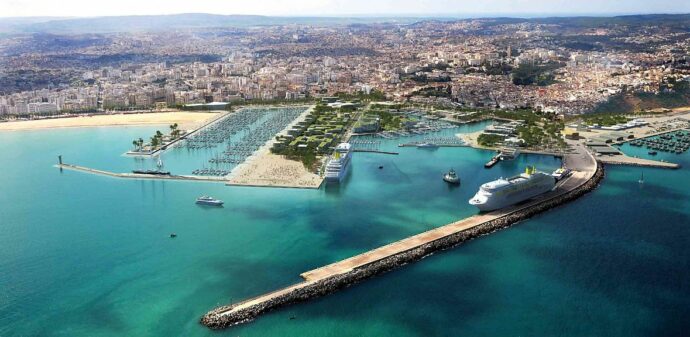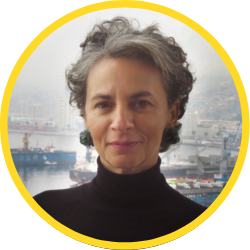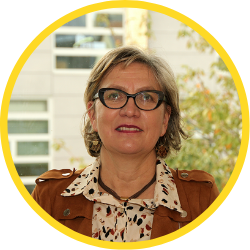Launch of the English programme in 2026!
Register
The Associate Degree in Port City Sustainability is a joint initiative by the International Association of Ports and Cities (AIVP) and the International Institute of Ports and Cities (IIPC), a port city training organisation.
It is conceived as a practical tool for the use of different actors in ports and territories in their efforts to achieve the sustainable development goals. It therefore forms part of the goals of the AIVP 2030 Agenda, and specifically Goal No 4: “Promoting city port dialogue through a renewed governance approach aimed at reconciling the quest for economic and environmental performance with the well-being and aspirations of the population.”
Available in French from 2022 and in Spanish from 2023, the programme will be available in English for the 2025/2026 edition starting from October 2025.
More than 60 port city professionals have already been trained. The quality of the programme and the speakers, as well as the dynamic nature of the courses, were highlighted by all the participants in the feedback surveys we conducted.
- The programme lasts 58,5 hours. It is divided into 5 courses or modules.
- Classes in English will be held via the Zoom platform on Wednesdays and Fridays (time to be defined depending on the geographical origin of the participants).
- The English programme will start on Wednesday January 14, 2026.


The programme includes the following courses or modules:
-
Governance of Port Cities.
-
Economy of Port Cities.
-
Urban and Natural Environments of Port Cities.
-
Cultures and Heritage of Port Cities.
-
Prospects of Port Cities.
Objects of the Programme
- Provide systemic understanding of port cities and prioritise a comparative perspective within and between different geographical areas.
- Share experiences, innovations and good practices between people representing different ports, territories and parts of civil society.
- Reflect on the adaptation of practices to sustainable port city goals and propose improvements and/or innovations.
 ©SAPT
©SAPT
International Networking and Connections
The Course Program offers a unique opportunity to meet and exchange ideas with professionals from around the world. Over the sessions, a network of former participants has formed, enabling enriching interactions and reunions during the activities we regularly organize.
Programme content
#1 GOVERNANCE OF PORT CITIES
This course is the backbone of the training programme. You will learn to put notions of governance and governability into perspective through cases selected from several geographical areas. You will carry out a study in the field to identify the nature of port-city relations, and then reflect on the notion of renewed governance and its application to a case chosen by yourself based on your professional experience or your own interests.
Disciplines: Social Sciences (Political Sciences, Public Policy Analysis).
2030 Agenda goals: all, particularly goal No 4
#2 ECONOMY IN PORT CITIES
In this course, you will study the economic logics that underlie the problems and challenges of ports and territories. We will analyse the trends observed in the port and logistics sector and their effects on the economy of the territory. In particular, you will study the questions of adaptation to new legal and social demands to address climate change. Finally, you will put what you have learnt into practice in a specific case chosen by yourself based on your professional experience or your own interests.
Disciplines: Social Sciences (Economics, Geography, Trade and International Relations, Port Management and Logistics).
2030 Agenda: goals No 2 and 5.
#3 URBAN AND NATURAL ENVIRONMENTS OF PORT CITIES
In this course, you will study relations between the port, logistics, the territory and its inhabitants. You will analyse the urban and environmental dimensions of port cities. We will take an across-the-board approach to adaptation to the new legal and social demands for the preservation of natural spaces, adaptation to climate change, and the quest for a better quality of life. Finally, you will work on a specific case chosen by yourself based on your professional experience or your own interests.
Disciplines: Natural Sciences, Engineering, Social Sciences and Humanities (Geography, Urbanism, Architecture, Sociology).
2030 Agenda: goals No 1, 3, 8, 9 and 10

#4 CULTURES AND HERITAGE OF PORT CITIES
In this course, you will study the specific dimensions of the identity, heritage and culture of port cities. We will use a transdisciplinary approach with a comparative and historical perspective in order to understand the specific character of port cities and the nature of the conflicts and synergies which they may generate. Finally, you will work on a specific case chosen by yourself based on your professional experience or your own interests.
Disciplines: Social Sciences and Humanities (History, Urbanism, Architecture, Sociology).
2030 Agenda: goal No 6
#5 PROSPECTS OF PORT CITIES
In this last course, you will learn about the main aspects of the methods used to analyse the prospects of territories on the one hand and ports on the other. We will study concrete examples of the application of these methods to port cities. At the end you will be expected to make proposals for achieving the goals of sustainable port cities. The course demands collective work and requires you to have completed the first four courses.
Disciplines: Futures Studies, Social Sciences and Humanities.
2030 Agenda goals: all.
Participants
This programme will bring professionals employed in ports and their territories and members of civil society together in a single training space, encouraging dialogue and understanding of the logics of the different actors. It is also an opportunity for networking.
Learning
Method
The courses are conceived as a practical tool for the use of professionals employed in ports and territories in their professional practices and/or civic contributions.
They combine theoretical aspects, essentially defining concepts, with practical work on case studies and fieldwork.
Great weight will be placed on sharing knowledge between participants in order to optimise the richness of experiences and points of view, related either with the training or with geographic origin.
Teachers
The teachers will be professionals and university level instructors, basically drawn from the AIVP Network of Experts. Insofar as possible, they will be drawn from the same geographical areas as the programme participants.
Results of learning
At the end of each course, the students will have:
- Acquired systemic, interdisciplinary and transdisciplinary knowledge of port cities.
- Shared their professional practice or civic contribution in a comparative perspective within and between different geographical areas.
- Learnt the logics used by different actors when analysing a problem and in searching for common solutions.
General Information: English programme
The courses in English will take place on Wednesdays and Fridays for one hour and a half. They will start on Wednesday January 14, 2026.. The timetable of the courses will be communicated once the geographical origin of each participant will be known.
| Cours | |
|---|---|
| 1. Governance | |
| 2. Sustainable economy of Port Cities | |
| 3. Urban and natural environment of Port Cities | |
| 4. Heritage and culture of Port Cities | |
| 5. Prospects of Port Cities |
Details and timetables of courses in spanish
Fees for the English programme
AIVP members
- 5 blocks – Year 2026
- Fee: €3600 excluding VAT
Non-members of the AIVP
- 5 blocks – Year 2026
- Fee: €4800 excluding VAT
NGOs, teachers and civil society representatives (*)
- 5 blocks – Year 2026
- Fee: €2880 excluding VAT
(*) To benefit from the reduced rate, registration fees must be paid by the participant and not by their employer. Employer or trade union organisations are not eligible for the NGO rate.
Your registration will be validated on receipt of payment.
In the case of multiple registrations from the same organisation, a 15% discount will be applied from the second participant onwards (maximum 3 people/organisation).
Number of participants:
The maximum number of participants is limited to 25. If there are fewer than 10 participants, the course programme may be postponed.
Certificates:
Course certificates will be delivered by AIVP and IIPC.
Contacts
Programme organisers:

IIPC: Dr Sabah ZRARI
Academic Director of the programme of course ‘Port cities Sustainability’
sabah.zrari@iipc.cl
+56 985 670 705
Doctor in Political Sciences, Sciences-Po Paris; Master’s Degree in Research in Public Policies and Comparative Societies, Sciences-Po Paris; Higher Studies Diploma (DESS) in Urban planning and ordering and local development, Sciences-Po Paris. Since 2019, Sabah Zrari has run several further education programmes on the sustainable development of Port Cities.

AIVP: Dr José M P SANCHEZ
Director of the AIVP 2030 Agenda, projects and contents, and Member of the AIVP Board of Directors
jsanchez@aivp.org
+33 (0)2 35 42 76 55
Dr José M P Sánchez is responsible for developing the AIVP 2030 Agenda and associated tools. He is also responsible for the coordination of AIVP’s content and communication, international projects, the Port Centres Network, and the Cruise Ships and Port Cities Working Group, as well as the Network of Experts. In 2019, he completed his doctorate at Hafencity University Hamburg, in which he studied sustainable relations between ports and cities. During his doctorate course he received various grants to enable him to carry out his research. José M P Sánchez qualified as an architect in 2011; he has worked in well-known studios and as an independent consultant, conference speaker and researcher.
Registration:

Corinne LALLEMAND
Deputy General Manager General Administration Member of the Management Committee
clallemand@aivp.org
+33 2 35 42 78 84
